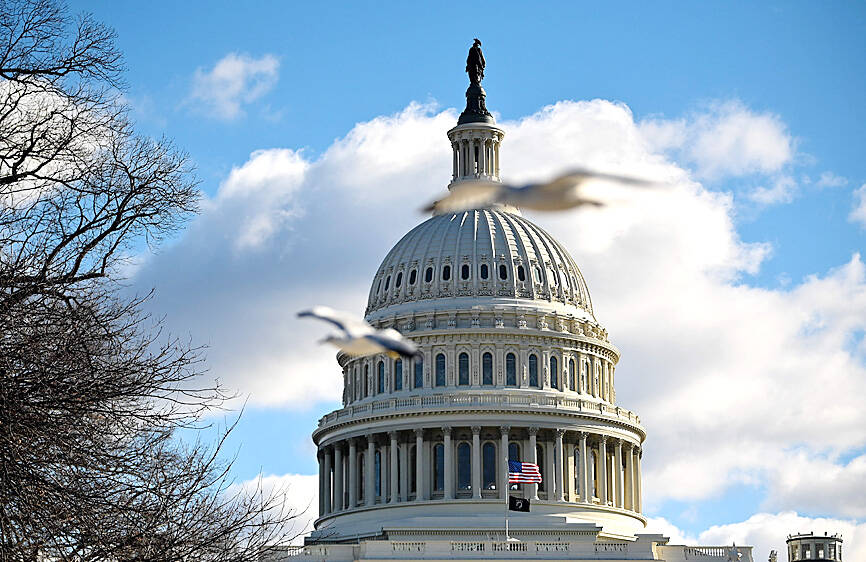The US’ National Defense Authorization Act (NDAA) enhances US support for Taiwan and counters China’s misrepresentation of UN Resolution 2758, the Formosan Association for Public Affairs (FAPA) said in a statement on Tuesday.
The Washington-based Taiwanese nonprofit promotes cooperation between Taiwan and the US.
US President Joe Biden on Monday signed the NDAA for the 2025 fiscal year into law. The bill authorized US$895 billion for the US Department of Defense, including up to US$300 million for measures that promote Taiwan-US security cooperation and enhance Taiwan’s defense capabilities.

Photo: AFP
Among the NDAA provisions favorable to Taiwan was the Building Options for the Lasting Security of Taiwan through European Resolve Act, aimed at enhancing US-Europe cooperation to bolster Taiwan’s security and international presence, the FAPA said.
The bill also encourages the US and Europe to stress the differences between their “one China” policies and that of Beijing’s “one China principle,” and refute Beijing’s claims that UN Resolution 2758 recognizes its territorial claims over Taiwan, the group said.
It applauded the “critical legislation to counter the People’s Republic of China’s (PRC) groundless territorial claims over Taiwan, and ensure Taiwan’s continued freedom and independence amid China’s increasing aggression toward Taiwan,” the statement said.
The “FAPA strongly urges the incoming [US president-elect] Donald Trump administration to prioritize and intensify efforts to combat the PRC’s baseless territorial claims and its escalating aggression toward Taiwan,” FAPA president Kao Su-mei (林素梅) said in the statement.
However, the NDAA’s provisions only authorize Pentagon programs, but the actual funding has to be covered in a separate spending bill for the fiscal year ending in September next year, Reuters reported, indicating that funding for all of the measures is not guaranteed.

SECURITY: As China is ‘reshaping’ Hong Kong’s population, Taiwan must raise the eligibility threshold for applications from Hong Kongers, Chiu Chui-cheng said When Hong Kong and Macau citizens apply for residency in Taiwan, it would be under a new category that includes a “national security observation period,” Mainland Affairs Council (MAC) Minister Chiu Chui-cheng (邱垂正) said yesterday. President William Lai (賴清德) on March 13 announced 17 strategies to counter China’s aggression toward Taiwan, including incorporating national security considerations into the review process for residency applications from Hong Kong and Macau citizens. The situation in Hong Kong is constantly changing, Chiu said to media yesterday on the sidelines of the Taipei Technology Run hosted by the Taipei Neihu Technology Park Development Association. With

A US Marine Corps regiment equipped with Naval Strike Missiles (NSM) is set to participate in the upcoming Balikatan 25 exercise in the Luzon Strait, marking the system’s first-ever deployment in the Philippines. US and Philippine officials have separately confirmed that the Navy Marine Expeditionary Ship Interdiction System (NMESIS) — the mobile launch platform for the Naval Strike Missile — would take part in the joint exercise. The missiles are being deployed to “a strategic first island chain chokepoint” in the waters between Taiwan proper and the Philippines, US-based Naval News reported. “The Luzon Strait and Bashi Channel represent a critical access

‘FORM OF PROTEST’: The German Institute Taipei said it was ‘shocked’ to see Nazi symbolism used in connection with political aims as it condemned the incident Sung Chien-liang (宋建樑), who led efforts to recall Democratic Progressive Party (DPP) Legislator Lee Kun-cheng (李坤城), was released on bail of NT$80,000 yesterday amid an outcry over a Nazi armband he wore to questioning the night before. Sung arrived at the New Taipei City District Prosecutors’ Office for questioning in a recall petition forgery case on Tuesday night wearing a red armband bearing a swastika, carrying a copy of Adolf Hitler’s Mein Kampf and giving a Nazi salute. Sung left the building at 1:15am without the armband and apparently covering the book with a coat. This is a serious international scandal and Chinese

COUNTERINTELLIGENCE TRAINING: The ministry said 87.5 percent of the apprehended Chinese agents were reported by service members they tried to lure into becoming spies Taiwanese organized crime, illegal money lenders, temples and civic groups are complicit in Beijing’s infiltration of the armed forces, the Ministry of National Defense (MND) said in a report yesterday. Retired service members who had been turned to Beijing’s cause mainly relied on those channels to infiltrate the Taiwanese military, according to the report to be submitted to lawmakers ahead of tomorrow’s hearing on Chinese espionage in the military. Chinese intelligence typically used blackmail, Internet-based communications, bribery or debts to loan sharks to leverage active service personnel to do its bidding, it said. China’s main goals are to collect intelligence, and develop a